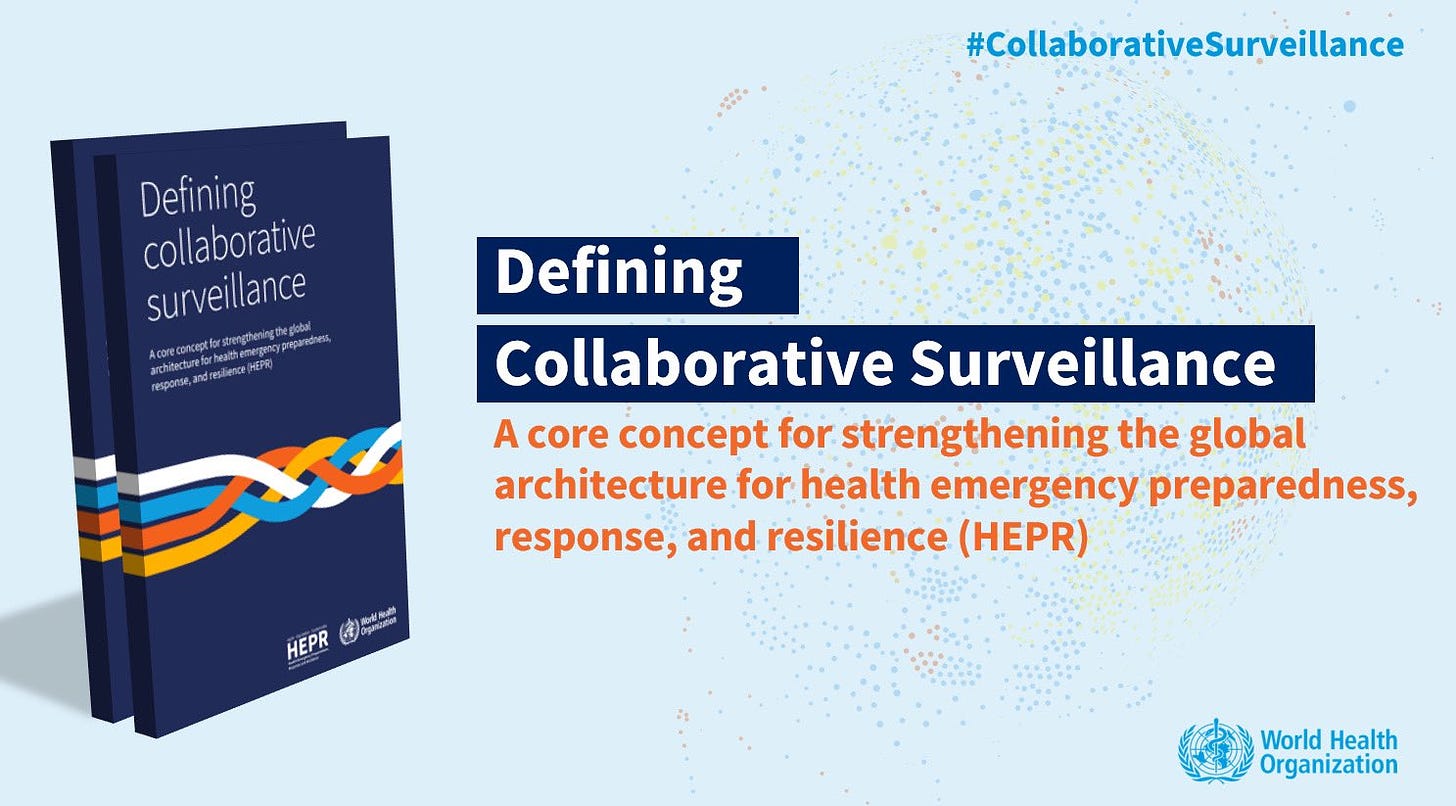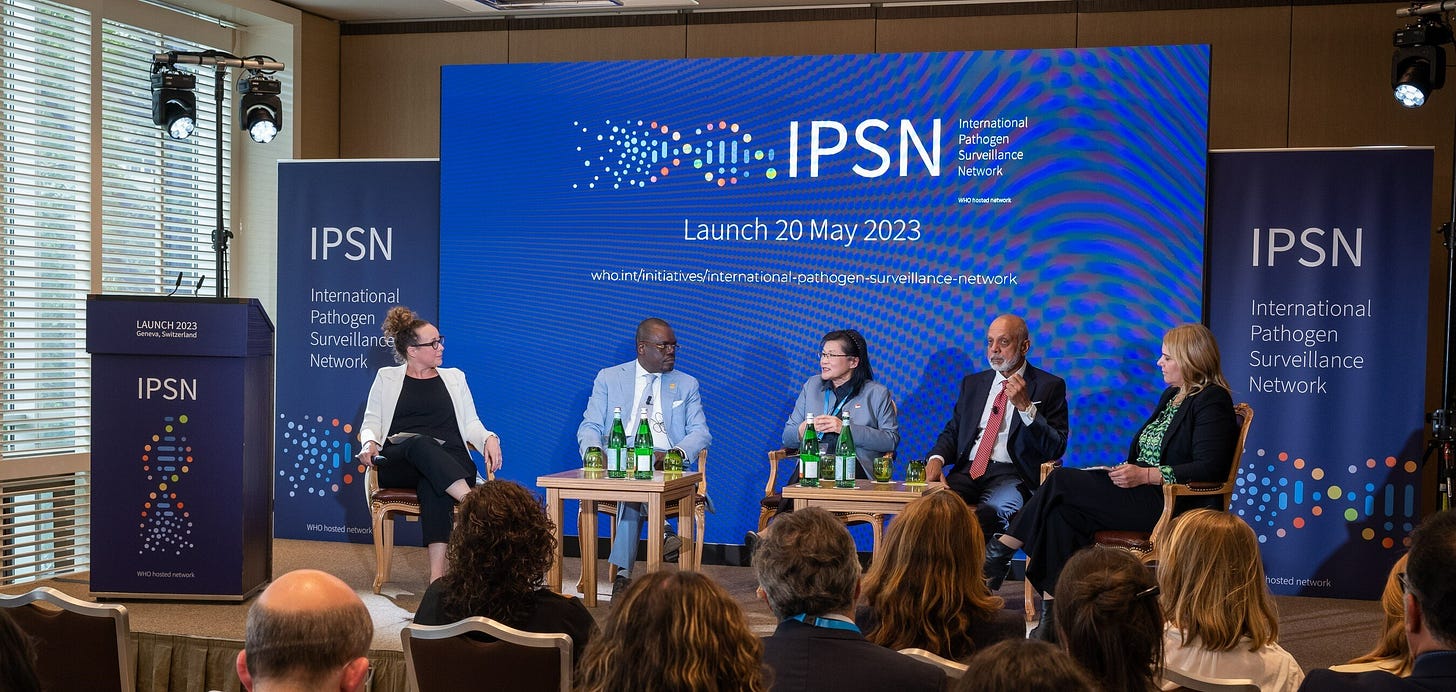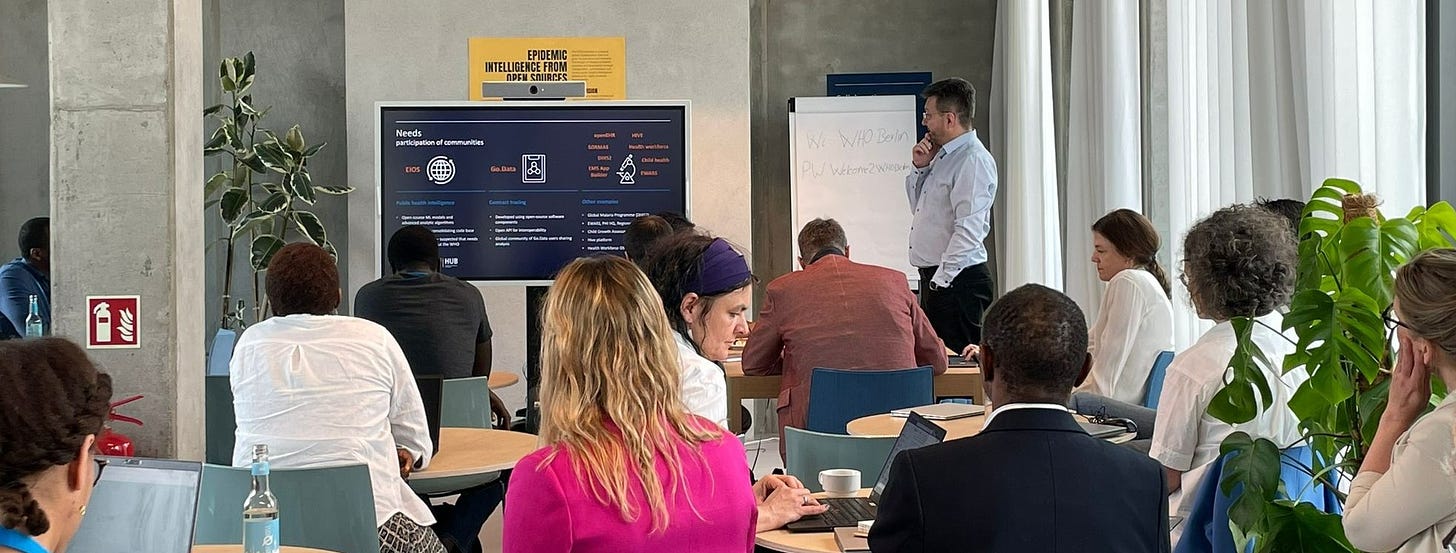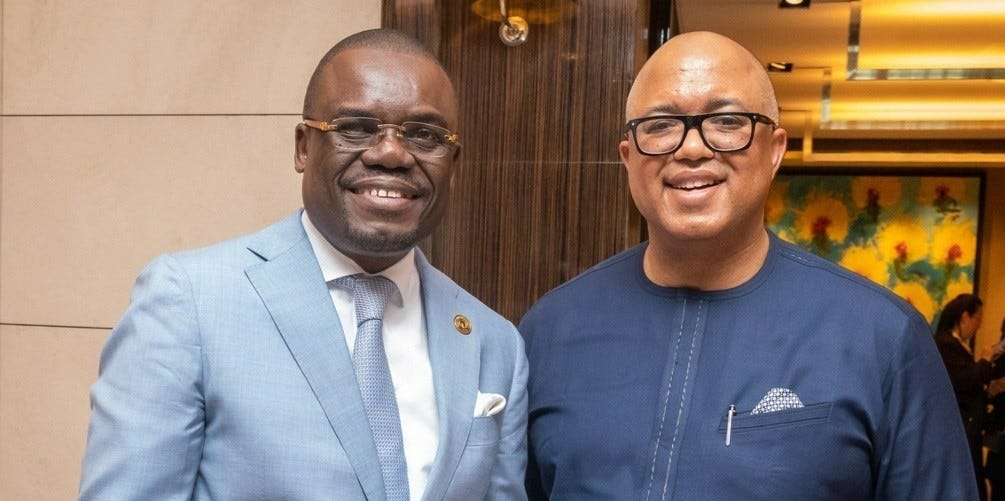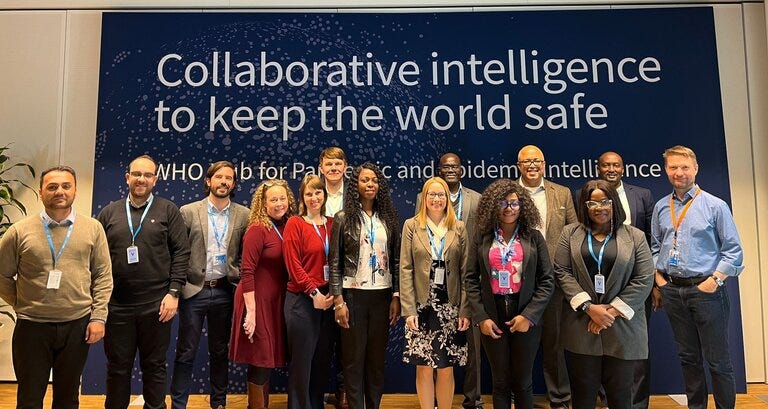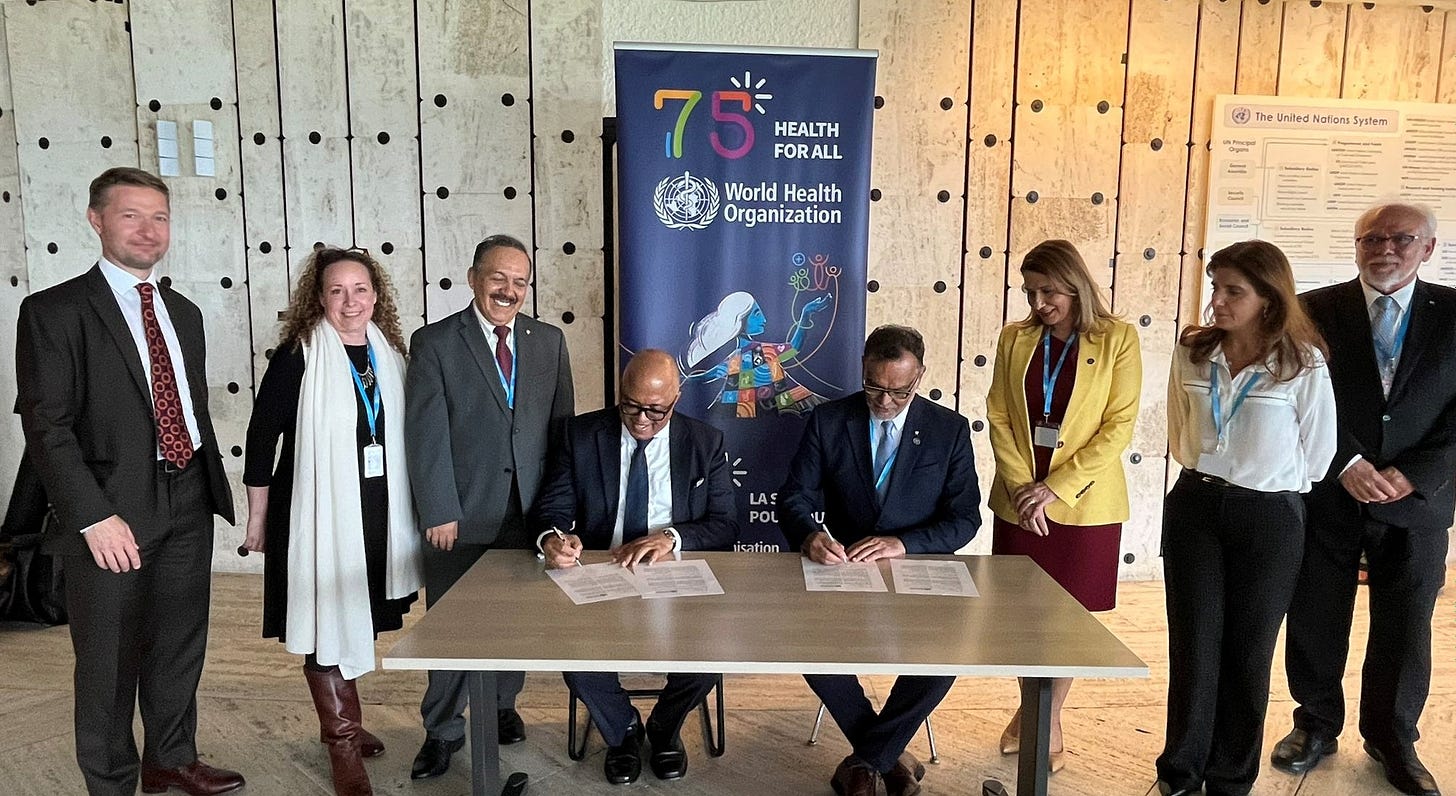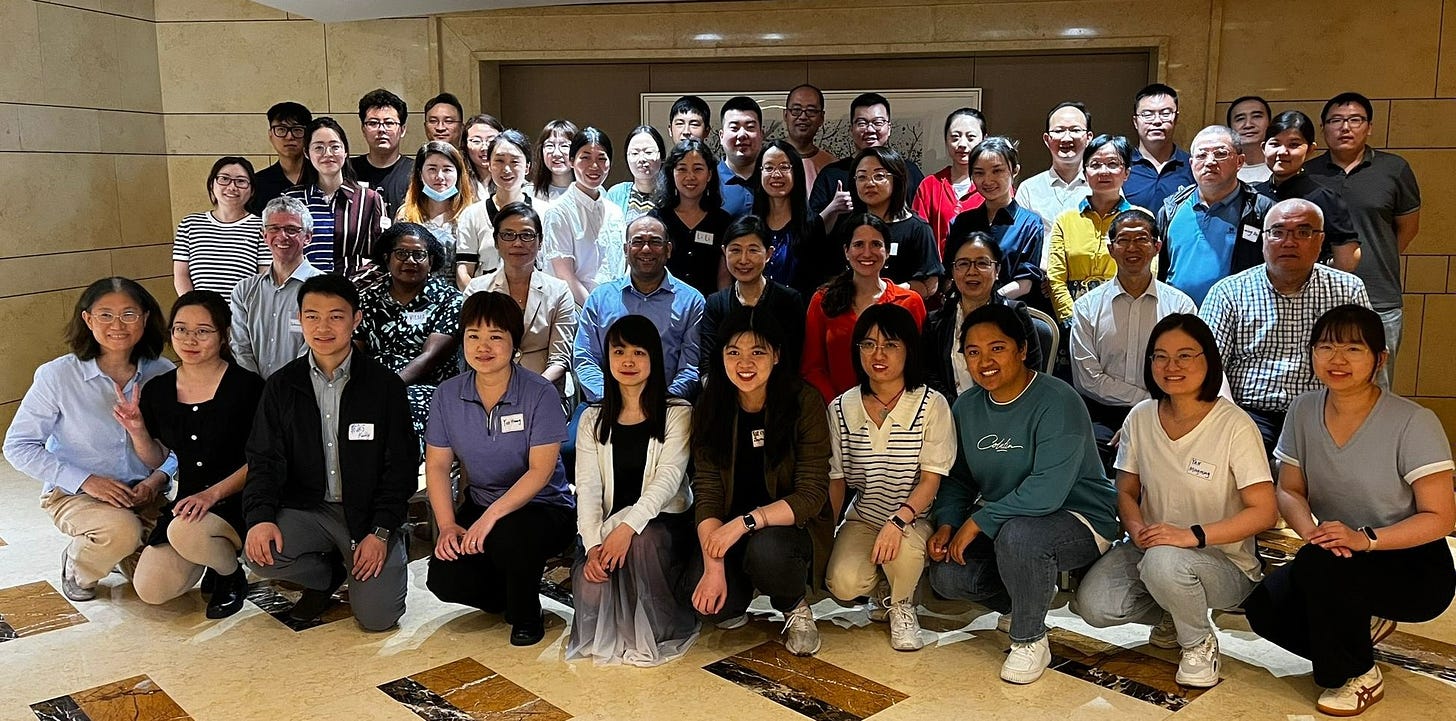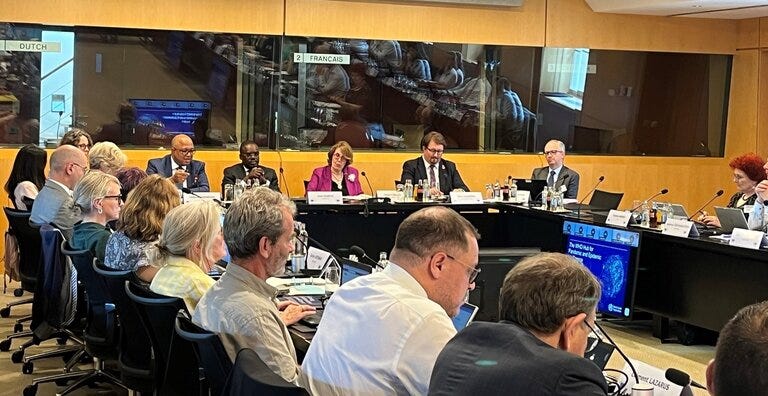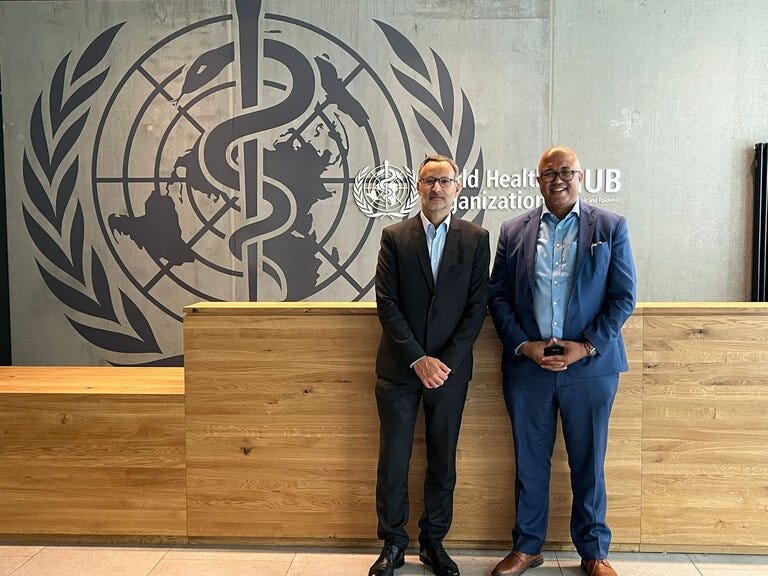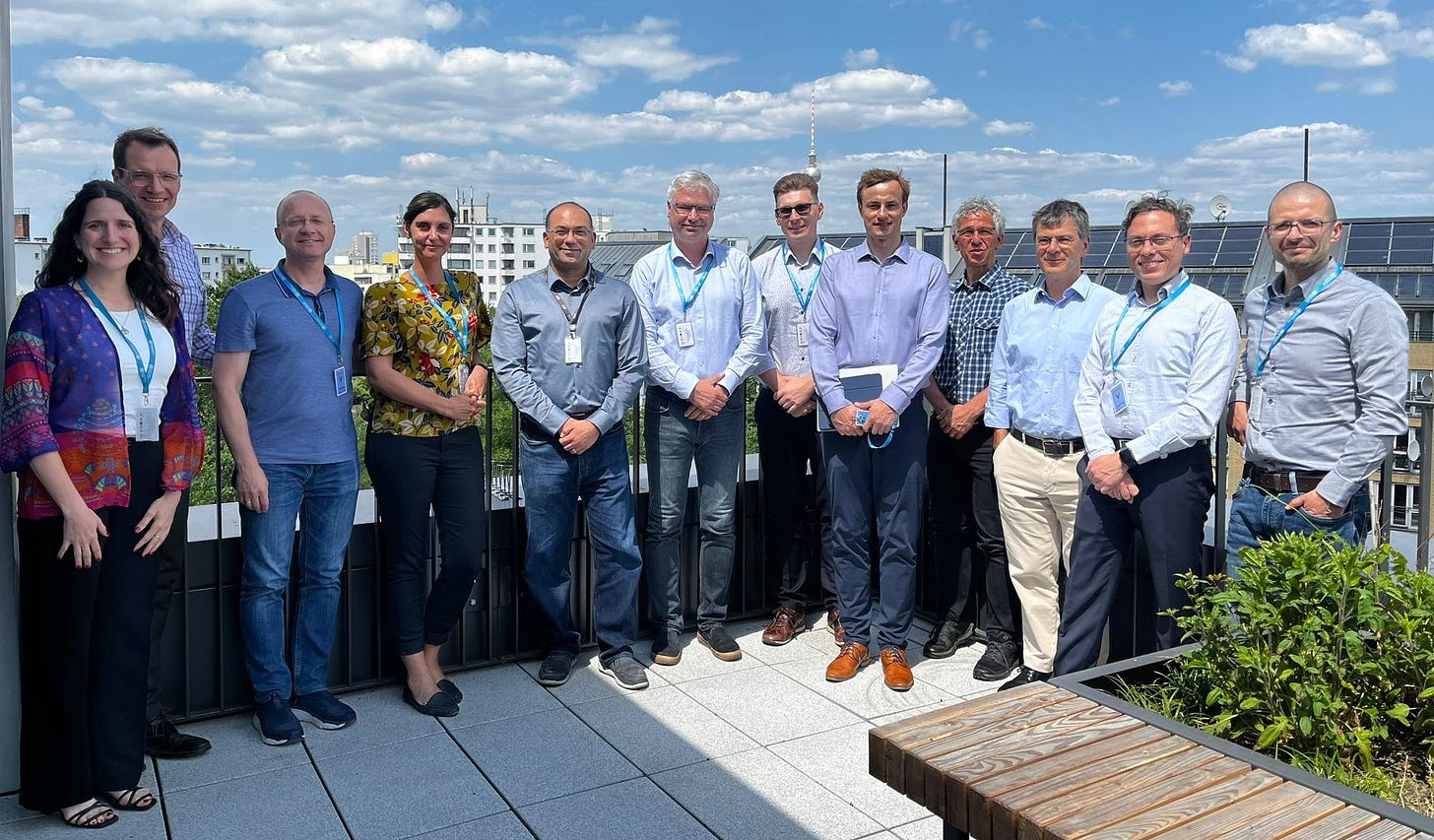Welcome to the WHO Hub for Pandemic and Epidemic Intelligence Newsletter!
We are thrilled to share highlights from our productive second quarter of 2023. This quarter was filled with significant events and milestones that have advanced our work forward. Here are some of the key highlights:
publication of the Collaborative Surveillance concept paper, which serves as the foundation for our programme of work,
launch of our flagship initiative International Pathogen Surveillance Network (IPSN),
announcement of partnerships with the Rockefeller Foundation and Fiocruz,
fifth session of the WHO Pandemic Hub’s Speaker Series, and launch of the Open Source Programme Office (OSPO), and
overview of the Hub’s engagement during the 76th World Health Assembly to advance collaborative surveillance in action.
Read on for more details!
GLOBAL ENGAGEMENT AND PRIORITY SETTING
Defining Collaborative Surveillance to Improve Public Health Emergency Decision Making
In May, WHO published a concept paper titled “Defining Collaborative Surveillance”, which addresses the increasing need for timely and effective intelligence to support decision-makers during public health emergencies.
Collaborative surveillance is “the systematic strengthening of capacity and collaboration among diverse stakeholders, both within and beyond the health sector, with the ultimate goal of enhancing public health intelligence and improving evidence for decision making”. This approach aims to enhance our collective ability to prevent, prepare for, and respond to emergencies as part of WHO’s work on health emergency prevention, preparedness, response, and resilience (HEPR).
The concept paper serves as a valuable resource for stakeholders involved in surveillance activities, providing a framework for collaboration and coordination. It offers guidance on how to establish better governance structures, enhance capabilities, foster cross-sector collaboration and build trust – all crucial elements for strengthening health emergency capacity in countries. To further emphasise the importance of collaborative surveillance, The Lancet published a commentary written by WHO colleagues at global and regional levels and our partners, underscoring the need for improved coordination and collaboration to strengthen global health emergency preparedness and response capacity.
Launch of the Global Network to Detect and Prevent Infectious Diseases Threats
We are excited to announce the launch of an initiative aimed at protecting communities around the world from infectious disease threats. On May 20, we launched the International Pathogen Surveillance Network (IPSN) with our partners.
The IPSN is a global network that harnesses the power of pathogen genomics to enhance epidemic and pandemic preparedness and response. Genomics is a vital tool in disease surveillance, offering valuable insights for effective decision-making. However, despite the progress made during the COVID-19 pandemic, many countries still face challenges in collecting, analysing, and utilising genomic data to inform public health interventions.
The IPSN provides an opportunity to further strengthen disease surveillance and response. By connecting countries, regions, and disease-specific networks, this platform facilitates collaboration and knowledge sharing. It empowers the development of robust systems for sample collection, analysis, and data-driven decision-making, strengthening our ability to detect, prevent, and respond to disease threats.
The IPSN is a global collaborative effort that transcends geographical boundaries. By leveraging the expertise and resources of diverse stakeholders, we are building a stronger defence against emerging infectious diseases. This initiative represents a significant leap forward in our collective mission to build a collaborative system to better detect, prevent and respond to disease threats. More info here.
© Andrey ART
Partnering with the Rockefeller Foundation to Expand Global Pandemic Preparedness in Era of Climate Change
On May 23, we launched a new partnership with the Rockefeller Foundation aimed at cultivating global networks for pathogen detection and strengthening pandemic preparedness capabilities. This transformative collaboration will enable us to broaden our surveillance for diseases that are exacerbated by climate change. The Rockefeller Foundation has generously committed US$ 5M in catalytic funding and technical assistance to support priority projects at the WHO Pandemic Hub. Through this partnership, we will accelerate global collaboration in genomic surveillance, enabling more effective pathogen detection and response. We will also focus on the adoption of advanced data tools to enhance our ability to identify and track emerging infectious diseases. Furthermore, we will assess the threats posed by climate change to outbreak patterns, strengthening our preparedness for climate-aggravated health crises.
“Climate change is increasing both the risk of another global pandemic and the need to collaborate and share data. We’re proud to partner with the Hub to expand its focus on preventing pandemics fuelled by climate change.”
- Dr. Rajiv Shah, President of The Rockefeller Foundation
Launch of the Open Source Programme Office (OSPO) at the WHO Hub Speaker Series
The fifth session of our Speaker Series focused on the theme of Open Source solutions for health emergency preparedness and response. Held on June 13, the event also marked the launch of the WHO OSPO, an integral part of the WHO Hub for Pandemic and Epidemic Intelligence.
During the session, experts shed light on the concept of open source beyond software licensing, emphasising the importance of collaborative development, minimising duplicative efforts, and sharing innovation costs. Samuel Mbuthia, who leads the OSPO, introduced his colleagues Mala Kumar and Catharina Maracke who delved into the broader applications of open source principles.
Dr. Yaw Anokwa, a computer scientist and the founder of ODK, discussed the challenges and opportunities in open-sourcing digital tools, drawing on his extensive experience with building the ODK platform. Dr. Hajer Letaief from the National Observatory of New and Emerging Diseases of the Ministry of Health Tunisia, shared valuable insights into the country’s digital health strategy, highlighting their successful implementation of the open-sourced SORMAS for integrated disease surveillance.
Dr. Alain Labrique, Director of the Department of Digital Health and Innovation at WHO, moderated a panel discussion. The panel emphasised the need for sustained human networks and financial resources to support Open Source solutions, aiming to reduce barriers and de-risk investments for Member States.
Watch the session here:
Open Source Programme Office (OSPO) Community Exchange
To kick off a global outreach to Open Source contributor communities, the OSPO held an informal exchange session on June 14 at the WHO Hub in Berlin. This engaging session brought together participants from various WHO departments as well as German government ministries, GIZ, Robert Koch Institute (RKI), the Sovereign Tech Fund, GitHub and Google.
Building on discussions from our fifth Speaker Series session, this exchange delved deeper into the development of open-source digital solutions for health emergency preparedness and response. Participants explored the importance of engaging broader communities of Open Source contributors to collaboratively innovate technologies that enhance emergency preparedness and response efforts. Additionally, the session addressed the crucial aspect of funding Open Source digital solutions for emergency preparedness and response. Join the conversation here!
© WHO / Isabel Redies
Strategic Engagement During the 76th World Health Assembly (WHA)
During the 76th WHA, global leaders and health experts highlighted the significance of aligning national, regional, and global efforts to effectively address future health emergency threats. In alignment, Assistant Director-General (ADG), Dr. Chikwe Ihekweazu emphasized the crucial importance of working closely with Member States to enhance health emergency preparedness, response and resilience (HEPR). The ADG stressed the need for collaborative surveillance, access to countermeasures for safe and scalable clinical care, provision of community protection, and coordination on lessons learned from the pandemic. By fostering robust partnerships and sharing knowledge and resources, we can collectively strengthen our communities' preparedness for any future health crisis.
© WHO / Pierre Albouy
Dr. Ihekweazu also met with several global and regional partners, including Dr. Jean Kaseya, Director General of Africa Centres for Disease Control and Prevention (Africa CDC), and Sandra Gallina, Director-General of Directorate-General for Health and Food Safety (DG SANTE), to explore how WHO can further support and collaborate on strengthening regional health security.
© WHO/Heraa Hajelsafi
At WHO, we firmly believe that strengthening national health emergency capacities forms the foundation for global health security. During the 76th WHA, Dr. Ihekweazu met with Member States including Fiji, Argentina, Lebanon and China to explore the potential of collaborative surveillance in enhancing public health intelligence and decision making.
Collaborative surveillance remains a high-level priority on our agenda. We are committed to cultivating the global public health ecosystem by building strategic intersections and aligning efforts with our partners. By fostering collaboration, we aim to provide comprehensive support to our Member States in their pursuit of stronger health emergency capacities.
REGIONAL AND COUNTRY PERSPECTIVES
Strengthening Disease Surveillance in Africa Through a Health-Security Partnership
We are excited to share an update on our recent workshop held from May 2-3 at the WHO Hub for Pandemic and Epidemic Intelligence. The workshop convened key partners for the Health Security Partnership to Strengthen Disease Surveillance in Africa (HSPA) project. Project partners including Africa Centers for Disease Control (Africa CDC), WHO regional offices for Africa and Eastern Mediterranean and the WHO Health Emergency Information and Surveillance Systems came together to strategize for the successful implementation of the project.
Funded through the G7’s Global Partnership Against the Spread of Weapons and Materials of Mass Destruction, the HSPA project aims to build upon existing efforts to strengthen Africa’s health security capabilities. It will focus on integrated disease surveillance, event-based surveillance, genomic surveillance, biosafety, and epidemic intelligence. Initially, the project will be implemented in six countries: Gambia, Mali, Morocco, Namibia, Tunisia, and South Africa.
© WHO/Geoffrey Namara
Partnering with Fiocruz to Advance Surveillance Systems in Brazil and Beyond
On May 22, we announced a new partnership with Fiocruz, a national public health agency under the Ministry of Health of Brazil. This collaboration will focus on strengthening genomic surveillance of pandemic interest, fostering scientific exchanges, technical cooperation and experience sharing.
The partnership also includes areas of cooperation for mitigation, adaptation and intersectoral collaboration in the field of climate change and health. By tapping into Fiocruz’s extensive technical expertise and network in the Latin America region and beyond, we aim to facilitate a stronger collaboration among stakeholders and advance pandemic surveillance systems.
“Fiocruz now joins and is part of this collaborative and creative environment that aims to develop and strengthen tools for the surveillance of pathogens. The partnership strengthens Fiocruz's position in the global effort to prepare for pandemics and is a recognition of our institutional, scientific and technological capacity in the field of surveillance.”
- Mario Moreira, President of Fiocruz
© WHO/Heraa Hajelsafi
Working with China to Enhance its Public Health Intelligence Capacities
The Epidemic Intelligence from Open Sources (EIOS) initiative recently welcomed China to its global community, marking a significant milestone in enhancing national and provincial public health intelligence capacities. From 16 -18 May, a delegation from the WHO Hub for Pandemic and Epidemic Intelligence, the WHO Regional Office for the Western Pacific (WPRO) and the Global Outbreak and Response Network’s (GOARN) secretariat conducted a 3-day EIOS System Training Workshop in Beijing.
The workshop, hosted by the Center for Global Public Health, China Centre for Disease Prevention and Control (China CDC), brought together over 35 participants including experts from the Center for Global Public Health, Public Health Emergency Center, National Institute for Communicable Disease Control and Prevention, National Institute for Viral Disease Control and Prevention, Hainan Provincial CDC, Yunnan Provincial CDC, and Guangdong Provincial CDC.
By joining the EIOS initiative, China takes an important step in bolstering its national and provincial public health intelligence systems, contributing to global health security. This achievement paves the way for improved early warning and response to public health threats, benefiting both China and the global health community. In the first half of 2023, the EIOS initiative, hosted at the WHO Pandemic Hub, has achieved significant growth by welcoming 16 Member States from all six WHO regions. More details can be found here.
© WHO/ Raquel Carrera Medialdea
COLLABORATIVE SURVEILLANCE IN ACTION
High-level Engagement to Advance Collaborative Surveillance
On June 20, Dr. Ihekweazu represented WHO at the EU Health Security Committee meeting. He delivered a keynote emphasising the importance of collaborative surveillance to strengthen national health emergency capabilities and foster global alignment. The speech highlighted the significance of regional collaboration with European Center for Disease Prevention and Control (ECDC) and Africa Centres for Disease Control and Prevention (Africa CDC).
© WHO/Heraa Hajelsafi
On June 21, Mr. Laurent Muschel, Deputy Head of European Commission's Health Emergency Preparedness and Response Authority (HERA) visited the WHO Pandemic Hub in Berlin. The purpose of the visit was to align strategic priorities and enhance support for strengthening country health emergency capabilities in the region.
© WHO/Heraa Hajelsafi
Advanced Analytics to Inform Decision-Making During Public Health Emergencies
In response to lessons learned from the COVID-19 pandemic, the WHO Pandemic Hub, in collaboration with Imperial College London’s MRC Centre for Global Infectious Disease Analysis, organized a technical workshop on May 9 and 10 2023 in Berlin. The workshop brought together 27 disease modelers and decision makers from 15 Member States and areas to share experiences and knowledge.
The workshop aimed to foster collaboration and establish effective pathways for data-driven decision making. Participants were engaged in discussions to identify barriers and facilitators for collaboration between policy makers and modelers, and to exploring potential joint actions for utilising advanced analytics in decision making. The workshop concluded with participants expressing their enthusiasm to form a network of experts to sustain the progress achieved.
Watch meeting highlights here:
Exploring Collaboration with DG SANTE and ECDC on EU Surveillance and Intelligence
In a meeting on June 12-13, the WHO Hub for Pandemic and Epidemic Intelligence in collaboration with the WHO Regional Office for Europe hosted representatives from Directorate-General for Health and Food Safety (DG SANTE) and European Center for Disease Prevention and Control (ECDC). The focus of the meeting was to explore potential areas of collaboration including collaborative surveillance, capacity building, and integration. The participants discussed shared priorities and identified steps to work together in Europe and globally.
© WHO/ Raquel Carrera Medialdea



